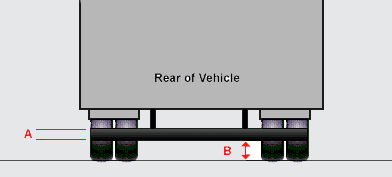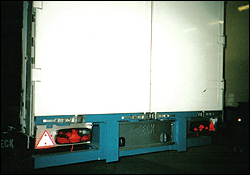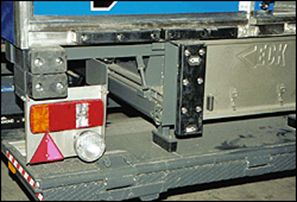HGV & LGV Rear Under-Run Protection Bars
Regulation 49 of the Construction and Use Regulations (1986) specifies Rear Under-Run Protection, with Regulation 50 concluding the maintenance of the same.
Regulation No 58 of the Economic Commission for Europe of the United Nations (UN/ECE) covers uniform provisions concerning the approval of:
- Rear Underrun Protection Devices (RUPDs)
- Vehicles with regard to the Installation of an RUPD of an approved type
- Vehicles with regard to their Rear Underrun Protection (RUP).
Both the above regulations can be found via links at Further Reading below.
Rear Under-Run
Information relating to Rear Under-run, including which vehicles are exempt;
- Regulation 49 - Fitment
- Regulation 50 - Maintenance
Requirement and Fitting
The rear under-run bar is to be fitted as close to the rear as practicable and must not be further forwards than 400 millimetres from the rear of the vehicle. The maximum width, without rear side guards is to be no more than the outermost edge of the outermost tyre, with a minimum width of 100 millimetres.
|
|
'A' is a minimum of 100 millimetres;
'B' is the maximum distance from the ground (when unladen) being 550 millimetres |
|
A rear under-run protection device is required to be fitted on:
|
|
This regulation does not apply to:
- A motor vehicle that has a maximum speed not exceeding 15 mph on the level ground under its own power
- A motor car or a heavy motor car constructed or adapted to form part of an articulated vehicle
- An agricultural trailer
- Engineering plant
- A fire engine
- An agricultural motor vehicle
- A vehicle fitted at the rear with apparatus specially designed for spreading material on a road
- A vehicle so constructed that it can be unloaded by part of the vehicle being tipped rearwards
- A vehicle owned by the Secretary of State for Defence and used for naval, military or air force purposes
- A vehicle to which no bodywork has been fitted and which is being driven or towed:
- For the purpose of a quality or safety check by its manufacturer or a dealer or distributor of, such vehicles; or
- To a place where, by previous arrangement, bodywork is to be fitted or work preparatory to the fitting of bodywork is to be carried out; or
- By previous arrangement to premises of a dealer in, or distributor of such vehicles
- A vehicle which is being driven or towed to a place whereby previous arrangement a device is to be fitted so that it complies with this regulation
- A vehicle specially designed and constructed, and not merely adapted, to carry other vehicles loaded onto it from the rear
- A trailer specially designed and constructed, and not merely adapted, to carry around timber, beams or girders, being items of exceptional length
- A vehicle fitted with a tail lift so constructed that the lift platform forms part of the floor of the vehicle and this part has a length of at least 1 metre measured parallel to the longitudinal axis of the vehicle
- A vehicle specially designed, and not merely adapted, for the carriage and mixing of liquid concrete
- A vehicle designed and used solely for the delivery of coal by means of a special conveyor which is carried on the vehicle and when in use is fitted to the rear of the vehicle so as to render its being equipped with a rear under-run protective device impracticable
- An agricultural trailed appliance
EU RequirementsWhere rear under-run protection is required, it must generally satisfy the specification in EU Directive 221/1970, as amended by EU Directive 2006/20/EC. The specifications within the directive are lengthy and concern vehicle manufacturers. However, where operators are concerned, a note should be taken regarding serious problems that may arise if the vehicles operated have the following. |
|
Tail lifts
In the case of vehicles fitted with a tail lift, bodywork or other parts that make it impracticable to fit a rear under-run protective device satisfying the specification, it is permissible to fit one or more devices that do not protrude beyond the overall width of the vehicle excluding any part of the device or devices.
The specification here is that if more than one device is fitted, the gap between the devices must not exceed 50 centimetres, and also the gap from the outermost device to the outermost edge of the vehicle should not exceed 30 centimetres.
Demountable Bodies
In the case of demountable body outfits, the regulations amend some of the measurements, so that fitting a rear under-run device to a vehicle does not interfere with the operation of the demountable body equipment.
Trailers
Where a trailer with a single axle or two close-coupled axles, the height of 550 millimetres referred to as the height from the underside of the device to the ground (see graphic at top of page) is measured when the coupling of the trailer to the vehicle by which it is drawn is at the height recommended by the manufacturer of the trailer.
Maintenance of the Device
Every device fitted to a vehicle in compliance with the requirements of regulation 49 shall at all times when the vehicle is on a road be maintained free from any obvious defect which would be likely to affect adversely the performance of the device in the function of giving resistance in the event of an impact from the rear.
The following link provides guidance and further information
Regulation 49 of the Construction and Use Regulations (1986) – Rear Underrun
https://www.legislation.gov.uk/uksi/1986/1078/regulation/49/made
Regulation No 58 of the Economic Commission for Europe of the United Nations (UN/ECE)
https://eur-lex.europa.eu/legal-content/EN/ALL/?uri=CELEX%3A42008X0830%2801%29
Rear Underrun Protection – EU Directive
https://www.legislation.gov.uk/eudr/1979/490/resources


